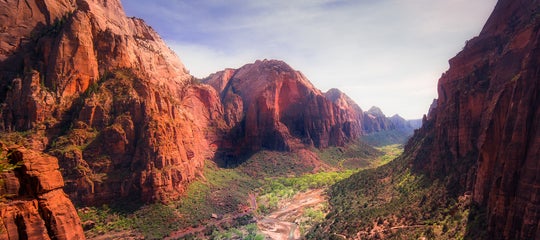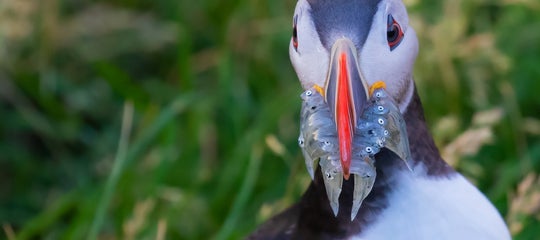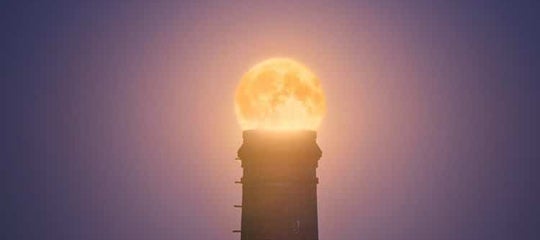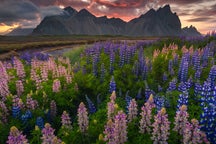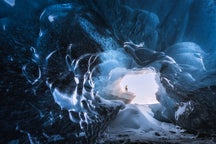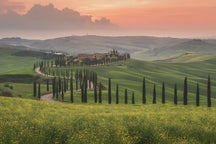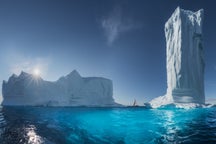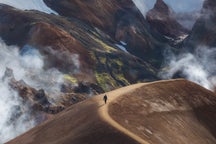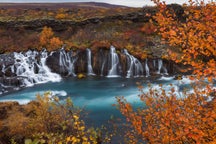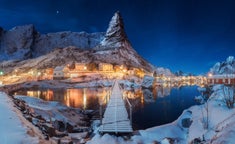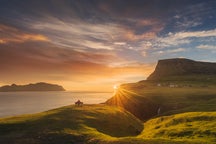
Going to Antarctica is on many people’s bucket list. If you love nature, this is something you have to do once in your life. The continent just has something about it. It’s one of the most remote places on earth and it takes a long time to get there. The adventure to get there, and all the ‘living up to the trip’ time is something that’s already amazing.
- Learn all about Photography in Antarctica
- Join us on this Antarctica Photography Expedition 2021 with Daniel Kordan
In January 2020, I went to Antarctica with Iceland Photo Tours along with Daniel Kordan, Raymond Hoffman and Kah-Wai Lin. Our expedition was on a brand new ship: The Greg Mortimer.
This ship is the first with the X-Bow technology in a passenger vessel. It’s a beautiful ship that carries 100 passengers (excluding crew). We from IPT worked together with the Greg Mortimer crew to give the best experience to our students. A combination of lectures from the Greg Mortimer crew and ourselves made for completely packed schedules every day.
 Gentoo penguins looking at our ship from the shore. Photo by: 'Albert Dros'.
Gentoo penguins looking at our ship from the shore. Photo by: 'Albert Dros'.
A typical day would start with a wake up call at around 7AM in the morning, after which we had breakfast and immediately went for a landing (going on shore). After the landing, we would have a lecture or some rest, have lunch, and go for another landing at a different place.
In between, the ship would change locations. The landings were done with Zodiacs. Each Zodiac carries around 10 people.
After dinner, we would have a bunch of lectures and hang out with our students to discuss photos and share knowledge. Every day was completely packed to get the most out of the experience.
 By using Zodiacs we go on land or cruise around icebergs and whales. Photo by: 'Albert Dros'.
By using Zodiacs we go on land or cruise around icebergs and whales. Photo by: 'Albert Dros'.
The Greg Mortimer is a very impressive vessel. It has beautiful lecture rooms, a high end restaurant, a gym, a library and even two jacuzzis. This all seems very unreal when you’re moving through the Antarctic peninsula and seeing the huge icebergs out of the windows when having dinner or spending some time in the library or even the jacuzzi outside.
The Greg Mortimer has very silent engines which is both incredible and weird. At night, it was completely quiet sometimes, which I really was not used to from a ship.
Crossing the Drake passage with this vessel was a breeze. We went through there in only 1.5 days and even though the sea was a little bit rough (no Drake lake), almost no one got sea sick. The ship sails really smoothly across the seas and the ice. What’s also impressive is how it breaks though pieces of ice with ease.
 Hydraulic platforms on the Greg Mortimer. Photo by: 'Albert Dros'.
Hydraulic platforms on the Greg Mortimer. Photo by: 'Albert Dros'.
The front functions as an icebreaker and there are hydraulic platforms where you can stand on, take pictures or just simply look at how smoothly the ship sails through the Antarctic peninsula. Seeing the ship move through those pieces of ice and hearing the ice crack has a strangely satisfying atmosphere to it. The ship is incredible, but that’s not why we’re going on this trip.
 Library. Photo by: 'Albert Dros'.
Library. Photo by: 'Albert Dros'.
 Outside Jacuzzi. Photo by: 'Albert Dros'.
Outside Jacuzzi. Photo by: 'Albert Dros'.
 Lecture room. Photo by: 'Albert Dros'.
Lecture room. Photo by: 'Albert Dros'.
Antarctica, the South Pole, is one of the most magical places on this planet. When you cross the Drake’s passage and the first huge icebergs (some the same size as skyscrapers) slowly move around the ship, you will know this is something special.
During the trip, we have a schedule with a number of landings on the peninsula. We usually do two per day (depending on the weather) and they all have great variety. Some places have amazing wildlife, many penguins, seals, birds – you name it. Others have beautiful mountains, rocks, harbours... every landing is different. But yeah, penguins you will basically see everywhere! So if you’re interested in seeing and photographing them, this trip is for you!
 Penguins in Antarctica. Photo by: 'Albert Dros'.
Penguins in Antarctica. Photo by: 'Albert Dros'.
 A group of penguins on the ice. Photo by: 'Albert Dros'.
A group of penguins on the ice. Photo by: 'Albert Dros'.
 Penguins playing in the snow. Photo by: 'Albert Dros'.
Penguins playing in the snow. Photo by: 'Albert Dros'.
 A penguin and chicks. Photo by: 'Albert Dros'.
A penguin and chicks. Photo by: 'Albert Dros'.
I’m a landscape photographer but I might have just changed to being a wildlife photographer after this trip. Observing penguins and their chicks is just too cute. I could spend hours just looking at them and trying to capture that perfect moment.
When we go to Antarctica, we go at the right timing to see a lot of chicks, and we saw so many! On some landings on the peninsula, you can literally see thousands of penguins. They’re cute, fascinating, funny and just super interesting animals to observe.
 A young penguin. Photo by: 'Albert Dros'.
A young penguin. Photo by: 'Albert Dros'.
 Penguin on the rocks. Photo by: 'Albert Dros'.
Penguin on the rocks. Photo by: 'Albert Dros'.
 Penguins in a line. Photo by: 'Albert Dros'.
Penguins in a line. Photo by: 'Albert Dros'.
Antarctica has a healthy balance between landscape and wildlife photography. You’ll have the chance to photograph landscapes when you go ashore with Zodiacs during the day, or simply photograph from the ship. Because when we’re at the peninsula, during times there are incredible pieces of ice and huge mountains, right outside. You can photograph them with a telephoto lens or sometimes even with the wide angle, as foreground ice constantly pops up near the ship.
We also do many Zodiac ‘cruises’ where we try to find nice angles to shoot landscapes and wildlife from: whales! During our trip last January, we saw countless humpback whales; sometimes multiple packs of four or more at the same time. The whales were often curious and very social, coming close to our Zodiacs and sometimes right beneath. They were also right next to the Greg Mortimer at some point. When the ship was anchored, they literally surrounded the ship. It was incredible to watch. I photographed many whales just from the ship, with the last sunlight hitting the glaciers around in the background. It was unreal.
 A whale at the base of the ice. Photo by: 'Albert Dros'.
A whale at the base of the ice. Photo by: 'Albert Dros'.
 Fin of a whale. Photo by: 'Albert Dros'.
Fin of a whale. Photo by: 'Albert Dros'.
 Whales near our photographers on a Zodiac. Photo by: 'Albert Dros'.
Whales near our photographers on a Zodiac. Photo by: 'Albert Dros'.
What to Expect on the Antarctica Expedition
So that’s a quick summary of what to expect during the epic Antarctica expedition with Iceland Photo Tours:
-
Experience and feel the magic of Antarctica
-
About two shore landings per day if time and weather allows
-
Top of the line expedition vessel with extreme comfort and luxury
-
Seeing too many penguins to handle in all different conditions
-
Whales!
-
Guidance from me, Daniel Kordan and the other amazing and experienced guides
-
Daily lectures about Antarctica itself and Photography
-
1 on 1 help with your photos and post-processing
-
Good food and drinks!
-
Cross Drake passage only once, and super fast with this advanced ship.
-
A good amount of time on the peninsula to get you all the shots you want
-
Make many new friends and likewise people along the way
-
Lots of fun!
Enjoy some more images of this epic trip. But be careful, you’ll most likely want to book this trip immediately!
Photos from Antarctica
 Ice in Antarctica. Photo by: 'Albert Dros'.
Ice in Antarctica. Photo by: 'Albert Dros'.
 Penguin on the ice. Photo by: 'Albert Dros'.
Penguin on the ice. Photo by: 'Albert Dros'.
 Seal. Photo by: 'Albert Dros'.
Seal. Photo by: 'Albert Dros'.
 Walking on the ice. Photo by: 'Albert Dros'.
Walking on the ice. Photo by: 'Albert Dros'.
 Reflection of a penguin. Photo by: 'Albert Dros'.
Reflection of a penguin. Photo by: 'Albert Dros'.
 Iceberg. Photo by: 'Albert Dros'.
Iceberg. Photo by: 'Albert Dros'.
 At the bow of the boat. Photo by: 'Albert Dros'.
At the bow of the boat. Photo by: 'Albert Dros'.
 The Greg Mortimer. Photo by: 'Albert Dros'.
The Greg Mortimer. Photo by: 'Albert Dros'.
 Surrounded by penguins. Photo by: 'Albert Dros'.
Surrounded by penguins. Photo by: 'Albert Dros'.
 Raymond Hoffman in the jacuzzi. Photo by: 'Albert Dros'.
Raymond Hoffman in the jacuzzi. Photo by: 'Albert Dros'.
 A whale up close to our Zodiac. Photo by: 'Albert Dros'.
A whale up close to our Zodiac. Photo by: 'Albert Dros'.
 The delicious food onboard. Photo by: 'Albert Dros'.
The delicious food onboard. Photo by: 'Albert Dros'.
Preparation
Some practical information because right now, you’re probably thinking: I’d love to go! But what do I bring? How do I prepare for a trip like this? How cold is it? What gear do I need?
Clothing & Temperatures
Going to Antarctica sounds special, IS special, but you don’t need to bring that much different stuff as you would normally bring on a photo tour in the ‘cold’. I say ‘cold’ because Antarctica in the summer is not as cold as you might think.
Temperatures will hover around -5 to 5 degrees Celsius around the peninsula. During our last visit, temperatures barely dropped below zero. Keep in mind though, it can get quite windy so the wind chill temperatures can be lower. That’s why it’s important to bring layers to keep yourself warm.
Next to layers, you need waterproof outer clothing, especially your pants and shoes. Layers and waterproof are your key words here. You’ll get a nice jacket during our expeditions, so you don’t have to worry about spending a fortune on an outer shell. So: Warm layers, waterproof!
Gear
Regarding gear: go as crazy as you want! Basically, just bring everything!
You can photograph landscapes from the Zodiac with basically a 12-24mm or 16-35mm wide angle lens but for most wildlife, you will need a 70-200mm or a longer lens. I preferred my 100-400mm as i could photograph almost anything with this one (or a 70-200mm with extender).
I photographed most of my penguin and whale shots with the 100-400mm lens. I didn’t bring heavier lenses like a 500mm or 400mm prime but if you have them and want to utilise them, then you can easily bring them. You can pick what lenses you bring for each ‘landing’ (going ashore) and we (the photo guides) will tell you which lenses are useful for every location. Most of the time, I would bring a wide angle and the 100-400mm in the Zodiac, but there’s no problem if you want to basically bring everything! You can leave other things on the boat if you don't want to carry all of your gear every time ashore so it’s very flexible!
You might also want to bring a simple waterproof camera that you can dip in the sea, like a waterproof GoPro, for example. There are often penguins swimming around the Zodiacs and you can dip your camera underwater to take some videos or photos of them.
And that’s basically it :) It’s all quite straightforward! Bring your gear, warm clothes and a good attitude and you’re ready to go while we take care of everything!
See you on the ship next January!
About the author: Albert Dros is a landscape photographer based in the Netherlands. You can find more of his work on his website or by following him on Facebook and Instagram.
Learn photography in-field in Antarctica with our landscape and wildlife photography experts! Join one of our Antarctica Photo Workshops!


